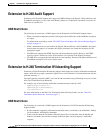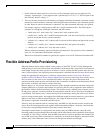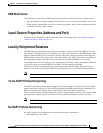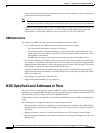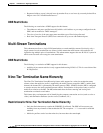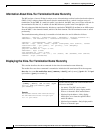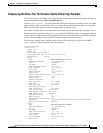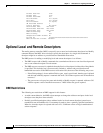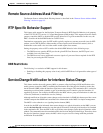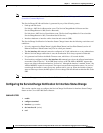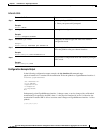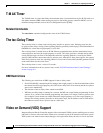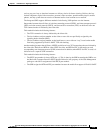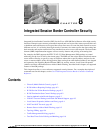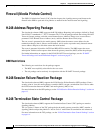
7-11
Cisco IOS XE Integrated Session Border Controller Configuration Guide for the Cisco ASR 1000 Series Aggregation Services Routers
OL-15421-01
Chapter 7 H.248 Services—Signaling and Control
Remote Source Address Mask Filtering
Remote Source Address Mask Filtering
The Remote Source Address Mask Filtering feature is described in the “Remote Source Address Mask
Filtering” section on page 8-5.
RTP Specific Behavior Support
This feature adds support for the Real-time Transport Protocol (RTP) Specific Behavior (rsb) property
of the ETSI TS 102 333 version 1.1.2 Gate Management (GM) package. This support allows the media
gateway controller (MGC) to disable RTP-specific behavior for a given termination. In this case, the
MGC overrides the default DBE behavior for RTP flows.
Terminations representing gates for RTP traffic typically require two streams per media (one for RTP
packets, one for RTCP packets). Mono-media sessions require two bi-directional streams, while a
multimedia session with voice and video traffic would require four streams.
Setting the property value to OFF overrides the default DBE behavior in the following ways:
• The DBE does not open the RTCP port for the given RTP flow. However, the RTCP port is not
available for use by other flows.
• The DBE does not reserve additional resources (equal to 5 percent of those required for the RTP
flow) for processing the RTCP stream.
DBE Restrictions
The following is a restriction of DBE support for this feature:
• Enabling or disabling this property value is only valid for RTP flows. It is ignored for other types of
flows.
ServiceChange Notification for Interface Status Change
This feature enables the media gateway (MG) to generate a ServiceChange H.248 notification to the
media gateway controller (MGC) containing the termination ID of the physical interface on the data
border element (DBE) when the interface experiences status changes. The termination ID is a nine-tier
namestring associated with a pinhole or pair of terminations and it contains a physical-interface-id
supplied by the user. For example, the MG notifies the MGC when a group of terminations is taken out
of service (link down) or returned to service (link up).
Although notification of interface status changes can be obtained via SNMP, this feature provides a more
reliable transport than SNMP and consolidates the information on the MGC for simpler management.
The MGC is also referred to as a signaling border element (SBE).
In order for the SBE to be informed about status changes on a physical interface on the DBE, you can
use the sbc interface-id command to map that physical interface to the physical-interface-id contained
in the termination ID. Thus the SBE is able to associate status changes on the physical interface with a
pinhole. The command inserts the termination ID in the ServiceChange H.248 message. Therefore, when
the physical interface changes status, the MG is able to report a service change with that particular
termination ID to the SBE.



